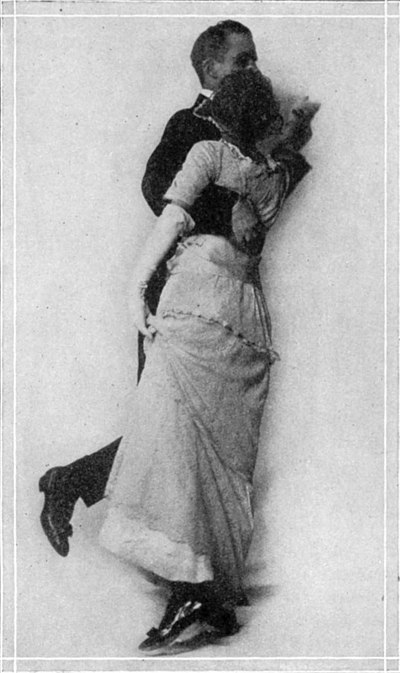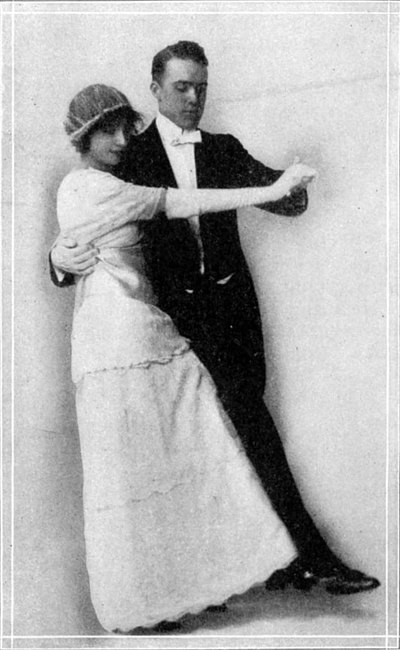The Modern Dances/Chapter 6
The Hesitation Waltz
The Man—Lesson 1
Position, as shown in Illustration 1.
Starting with the left foot take one step to the side, counting one. On this step throw all the weight of the body onto the left foot, rise on the toe, keeping the left knee straight, and in this position finish the count—two, three. See Illustration 13. The position shown should be assumed on the count of one and held through two and three. This holding of position through the counts two, three is what gives the dance its name—the Hesitation Waltz.
Now take one step backward with the right foot, stopping it almost on a line behind the left. Second, the left foot backward and slightly to the side. Third, draw the right foot up to the left. These are three quick steps—right, one; left, two; right, three—one count to each step—the regular waltz step. Repeat.Now study the diagram.
The Lady—Lesson 1
Position, as shown in Illustration 1.
Starting with the right foot take one step to the side, counting one. On this step throw all the weight of the body onto the right foot, rise on the toe, keeping the right knee straight, and in this position finish the count—two, three. See Illustration 13. The position shown should be assumed on the count of one and held through two and three. This holding of the position through the counts two, three is what gives the dance its name—the Hesitation Waltz. Now take one step forward with the left foot, stopping it almost on a line with the right. Second, the right foot forward and slightly to the side. Third, draw the left foot up to the right. These are three quick steps—left, one; right, two; left, three—one count to each step—the regular waltz step. Repeat.
Now study the diagram.
The Man—Lesson 2
Starting with the left foot take the hesitation step to the side, counting one, two, three, as in Lesson 1.
Now, instead of taking the next step backward, take it forward, and so on, as shown in the diagram.
The Lady—Lesson 2
Starting with the right foot take the hesitation step to the side, counting one, two, three, as in Lesson 1.
Now, instead of taking the next step forward, take it backward, and so on, as shown in the diagram.
The Man—Lesson 3
First, the hesitation step to the side, as in Lessons 1 and 2. Then, the waltz step backward, as in Lesson 1. The hesitation step to the side. The waltz step forward, as in Lesson 2, and so on, repeating backward and forward, as shown in the diagram.
The Lady—Lesson 3
First, the hesitation step to the side, as in Lessons 1 and 2. Then the waltz step forward, as in Lesson 1. The hesitation step to the side. The waltz step backward, as in Lesson 2, and so on, repeating forward and backward, as shown in the diagram.
Both Man and Lady—Lesson 4
Now you are ready to learn how to turn. It is very simple and will be done readily if you are familiar with the steps as taught in the preceding three lessons.
First, take the hesitation step to the side. Then make a quarter turn on the waltz step. Repeat three times to make the complete revolution. After mastering this quarter turn, make a half turn on the waltz step, repeating once for the complete revolution.Lesson 5—The Pivot
This is just what the name implies. It is a half turn on the hesitation step—the waltz step being omitted.
Take a long step to the side, counting one; rise on the toes and make a half turn on the two, three count. Repeat this several times.
Get plenty of spring into this figure, and as you pivot on the toe, swing the free foot well off the floor. See Illustration 14.
Other Hesitation Waltz Figures
Position, as shown in Illustration 1.
Start as at the beginning. Hesitate, waltz; hesitate, waltz—four measures. On the fifth measure the lady passes under the man's left arm. (See Illustration 15.) On the next measure both balance forward, the man on the left foot, the lady on the right. (See Illustration 16.) Balance backward, balance forward again and on the next backward balance both swing into original position and repeat the whole figure.
Position, as shown in Illustration 1.
Hesitate, waltz, hesitate—three measures. On the fourth measure dip (counting one, two, three), instead of waltz. The man dips backward and the lady forward. This will be found a simple and graceful figure and can be repeated as often as desired.
THE TWINKLE
Position, as shown in Illustration 6.
Both on the left foot balance forward, counting one, two, three. Then balance backward, counting one, two. On the three count, change
This change of feet is called the Twinkle, because it is done in the twinkling of an eye, so to speak.
Position, as shown in Illustration 18.
Both starting with the left foot, take the hesitation step to the side, the waltz step backward, repeating these steps several times. Then balance twice and come back, taking the hesitation step on the right foot instead of the left.
Position, as shown in Illustration 3.
Both starting with the left foot balance forward and back three times. As you balance backward the third time, "twinkle," as described in the Twinkle figure. This brings the right foot forward. Now one step forward on the right foot, a second step on the left foot, a third step on the right foot and swing half way round on the right toe. This brings you with the right foot forward and the lady on the man's left side instead of his right as at starting. Now balance forward and back three times, "twinkle," and repeat as above.












